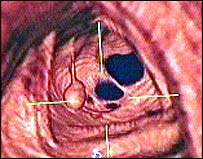'Harmless' Gene Mutation Increases Risk of Bowel Cancer
 According to a new Australian study a widespread, commonly found gene mutation once thought to be trivial, can significantly increase the risk of bowel cancer.
According to a new Australian study a widespread, commonly found gene mutation once thought to be trivial, can significantly increase the risk of bowel cancer.
The gene mutation present in as many as one in every 36 Caucasians was earlier considered to be a harmless abnormality.
John Olynyk, co-author of the study and deputy director of Western Australian Institute for Medical Research (WAIMR) said people with the defect who had a cancer pre- disposing abnormality were three times more likely to develop bowel cancer.
"What we discovered is that people who carry two copies of the gene mutation known as H63D, and who also have the gene mutations linked to bowel cancer, are three times more likely to develop bowel cancer but fortunately, this particular gene mutation is able to be readily detected in Australia," Olynyk said.
The researchers looked at more than 350 people from Australia and Poland who carried a specific gene mutation associated with a type of bowel cancer known as hereditary nonpolyposis colorectal cancer. This is a hereditary disorder that makes 5% of all bowel cancers and is usually found in younger people.
"What this research highlights is that people with a family history of bowel cancer would do well to have regular colonoscopies in the hope of picking up the early warning signs and help prevent the cancer from developing," he said.
"Being vigilant is critical, especially given that hereditary nonpolyposis colorectal cancer often strikes younger people who are less likely to get regular checks for bowel cancer."
Bowel or colorectal cancer is the third most common form of cancer, and it kills more than 6, 50,000 people worldwide per year. Besides heredity, factors that increase the risk of developing the disease are smoking, excessive intake of red and processed meats and alcohol, sedentary lifestyle, viruses such as human papilloma virus, and chronic ulcerative colitis, among others. However, detected early, the disease can be cured. These findings were published in the International Journal of Cancer.